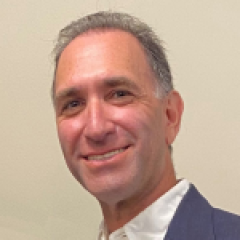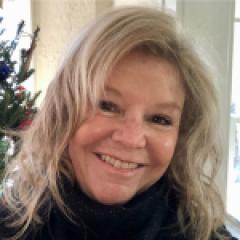Answer Sheet: At This School in Maine, the Entire State is the Classroom

Anna Power-Rokowski and Imti Hassan, both graduates of the class of 2019, are shown in the Katahdin region of Maine, where their entire class at Casco Bay High School spent a week as part of the annual “Junior Journey” in April 2018. Casco Bay is an Expeditionary Learning school in Portland. (Casco Bay High School spent a week as part of the annual “Junior Journey” in April 2018. Casco Bay is an Expeditionary Learning school in Portland. Casco Bay High School)
President Trump staked his position on America’s public schools in his inaugural address, when he referred to them as part of “American carnage.” His education secretary, Betsy DeVos, once called them “a dead end,” perpetuating a myth that American public education is failing everywhere.
There are, to be sure, public schools that are failing kids, sometimes horribly so. But there are others that are finding innovative and humane ways of educating students and trying to close the achievement and opportunity gaps that harm students from historically disadvantaged groups. And telling their stories is as important as calling out failure.
So against this backdrop, below is a profile of Casco Bay High School in Portland, Maine, the first of seven I will publish about the newest honorees of an annual project called “Schools of Opportunity.” The project, which started in 2014 as a pilot in two states and went national in 2015-16, recognizes publicly funded high schools that work to create learning environments to reach every student and close existing gaps.
It is based at the National Education Policy Center at the University of Colorado at Boulder (NEPC) and has honored several dozen schools by assessing them on factors including how well the adults in a school building provide health and psychological support for students as well as judicious and fair discipline policies, and broad and enriched curriculums. Student standardized test scores are not part of the assessments.
As a previous post on this blog about the project’s honorees said: “These schools do not cherry pick students using selective admissions or ‘push-out’ practices that falsely inflate test scores and graduation rates by eliminating anyone who struggles with behavior or academics. Nor can these schools assume that their students enjoy privileges such as book-filled homes, often-costly summer enrichment experiences, or college savings accounts — or even housing and food security.”
Schools submit applications explaining why they should be recognized. Next year’s application cycle is already open, and if you know a potential School of Opportunity, you may visit SchoolsOfOpportunity.org to learn more. The deadline is Jan. 31.
NEPC evaluates nominated schools on 10 criteria (see graphic at the end of the post for details), with each school choosing six to address in the application. Schools undergo a six-phase review process that includes a self-assessment, criterion-based and holistic reviews by school district and university experts (including educators from schools recognized in the past), and site visits by evaluators.
The seven honorees from the latest cycle, the 2018-19 school year, are Casco Bay High School in Portland, Maine; Clark Street Community School in Middleton, Wis.; Martin Luther King Jr. Early College in Denver; the Native American Community Academy in Albuquerque; Pocomoke High School in Pocomoke, Md.; Salt Lake Center for Science Education in Salt Lake City; and Social Justice Humanitas in Los Angeles.
This profile of Casco Bay High School was written by Kevin Welner and Linda Molner Kelley.
Welner, a founder of the Schools of Opportunity project, is the director of the National Education Policy Center at the University of Colorado at Boulder and a professor specializing in educational policy and law. Kelley is the former assistant dean of teacher education and partnerships and former director for outreach and engagement at the University of Colorado at Boulder.
By Kevin Welner and Linda Molner Kelley
Recognition Year: 2018-2019
Location: Portland, Maine
Enrollment: 387
Economically Disadvantaged: 41 percent
At Maine’s Casco Bay High School, the entire state is the classroom. Students have presented government officials with urban planning proposals based on visits to Portland’s City Hall and surveys of residents of the city’s neighborhoods. They’ve created a full-length documentary about rural Maine that aired on the state’s public television station. And they’ve developed a sense of community on wilderness trips that challenge students to step outside their physical and social comfort zones.
Casco Bay illustrates how the “expeditionary learning” approach can fully engage students with an emphasis on developing a sense of community, running as a thread throughout each student’s school career. Freshman year opens with a week-long orientation on a nearby island. Senior year also launches with a kayak or backpacking expedition. Both events, known as quests, promote citizenship, leadership and community.
Last year’s freshman trip kicked off a year-long, interdisciplinary inquiry into the question of what makes a successful community. On the senior trip, the students wrote sincere letters to freshmen, offering them advice on making the best of their time at the school. Each year’s senior trip also kicks off the students’ humanities course, in which students both complete a college application and a long-term independent research project at the intersection “between a personal passion and a need in the world.” The school reports that 98 percent of students have been accepted to college since it opened in 2005.
Casco Bay’s approach of state-as-classroom does not just involve sending students out into the world. It also brings the world to the school. Community members ranging from college professors to the students themselves teach week-long intensives in which students earn core and/or elective credits for mini-courses with academic explorations of such topics as Muslim American history and life (social studies credit), hip-hop (English credit), and mapping Portland’s rivers (college and high school science credit).
Seven years ago, the state of Maine passed a law requiring high schools to award diplomas based on proficiency in eight areas rather than adding up accumulated credit hours. That law was controversial and was problematic as applied in many schools, and has since been repealed — but many schools, including Casco Bay, embraced a system called proficiency-based grading. This means grading is meant to reflect whether specific standards have been met. In addition to this academic grade, students receive a “habits of work and learning” (HOWL) grade that assesses criteria such as completing homework and participating effectively in class.
Along with summer school, Casco Bay offers Frost School (fall) and Mud School (spring) for students who need it. Additional student supports include an Academic Strategies class, an ELL Academic Language class, three hours weekly of academic support time, and after-school tutoring.
On the flip side, students wanting a bigger challenge can add an “Exceeds” course to their schedule. One recent Exceeds class addressed the nature of evil, with readings drawn from Plato, Milton, and Shakespeare.
More broadly, the school’s curriculum focuses on long-term interdisciplinary projects often centered on a vital social justice question. Halim Moldaver, a CBHS senior, values this approach. “It’s empowering because a lot of our expeditions are based on examining problems the world is facing and then solving them,” he noted.
Recent themes include: What forces people to flee their homes for another country? What can be done to create a moral and just migration system? and How does the civil rights movement reflect and intersect with the Black Lives Matter movement?
Readings for core humanities courses include writings by a diverse set of authors, with titles such as Maya Angelou’s “I Know Why the Caged Bird Sings,” “Between the World and Me” by Ta-Nehisi Coates, “Exit West” by Mohsin Hadid and “The House on Mango Street” by Sandra Cisneros.
During advisory periods, student-facilitators lead “courageous conversations” on student-selected, equity-related topics such as cultural appropriation and gender stereotyping and roles.
Teaching at a school like Casco differs in important ways from teaching at a more traditional school. The school has its own teacher induction program to supplement the Portland School District’s offerings. Professional learning communities meet monthly with assistance from four teacher coaches. Grade-level meetings discuss student-related challenges and plan the school’s interdisciplinary curriculum. Monthly Crew or advisory meetings focus on areas such as social-emotional learning. Additional learning opportunities are designed by the school’s equity literacy professional-development task force.
“The relationships between students and teachers [are] so evidently closer,” said teacher Mallory Haar. “I never thought I could be as deeply a part of students’ lives, frankly, as I did when I got to Casco Bay.”
Halim agreed, saying that the emphasis on relationships means “you end up being pretty invested in everyone.”
Another senior, Sadie Johnson-Quillette, who transferred to Casco Bay from a traditional Maine high school captured the strong academic and social culture at the school. She observed, “I feel like teachers actually care and students are way more engaged and the work feels more meaningful. The work we do seems relevant to the world.”

How Schools of Opportunity are chosen. (How Schools of Opportunity are chosen. National Education Policy Center)
This blog post has been shared by permission from the author.
Readers wishing to comment on the content are encouraged to do so via the link to the original post.
Find the original post here:
The views expressed by the blogger are not necessarily those of NEPC.


